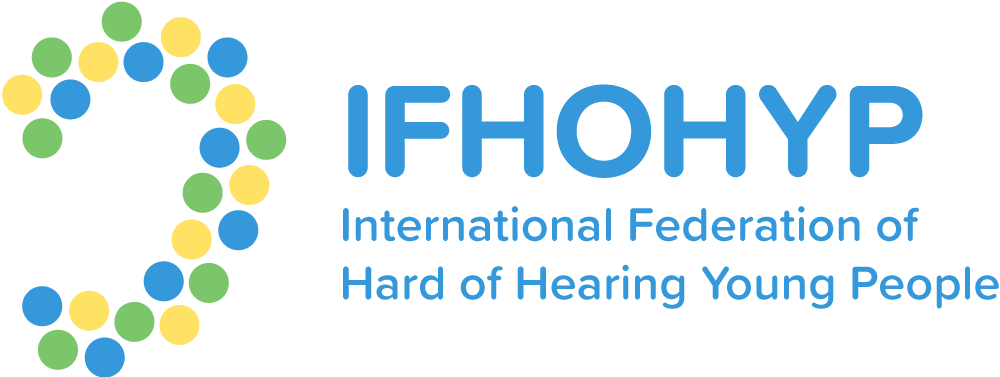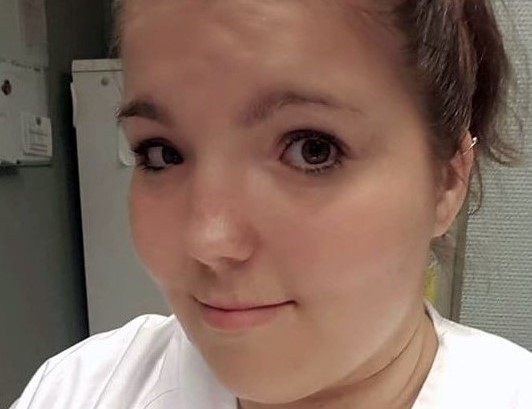Lets us introduce Camilla Mattjus , registered nurse in Finland, to you! What Does a Registered Nurse Do? How Possible for HOH to became nurse? Listen to Camilla Mattjus today!
Irina Ivanova: You are working as nurse now. Where did you get the dream to work in medical team?
Camilla Mattjus: Yes, been working as a registered nurse since December 2012. I got my dream already at a young age I’d say. According to my dad, I said already as a kid that I wanted to work within the medical field. There was some advertisement on TV showing nurses working in a disaster area, as humanitarian aid workers, and I told him: when I grow up, I will be working there as well. So, I have always felt I wanted to be able to help people and do something that matters. After finishing upper secondary high school, I applied to a nursing degree program both in Swedish (which is my mother tongue) and in English, got accepted to both programs but accepted the place at the English nursing degree program, as my goal was to one day work abroad and in some disaster area, to be able to help the most vulnerable.
What is it required to became nurse in Finland?
To become a Registered nurse in Finland you need to first have at least a vocational degree or matriculation exam to be able to apply to any Nursing degree program. The Nursing degree program is about 3,5 years long and after finishing the program you apply to the Finnish authorities to get authorization to work as a Registered nurse in Finland. When you start working you still do some exams in order to be allowed to administer medicines, pain medicines, medicines for children and intravenous fluids etc. – which you need to renew every 5 years to make sure you got updated skills.
Was it difficult for you to obtain necessary qualities for your work?
I would not say it was difficult to obtain necessary qualities for my profession, not more difficult than for others. In many ways I have noticed that I have had it easier when it comes to patient work: when considering that I read body language very well and can lipread. My difficulties have been mostly with the Finnish language, and when doing my practice placements and meeting supervisors who spoke only Finnish etc. as my mother tongue is Swedish (5% of the Finnish population have Swedish as their mother tongue) and I cannot really hear the Finnish language. That is where my struggle was mostly at.
Was it difficult to get job as nurse? Did you meet with stereotypes or discrimination as HOH nurse?
I must say that for me it wasn’t difficult to get a job as a nurse, 1) because there is and have been shortage of nurses, 2) because the nursing degree program I attended has a good reputation and 3) because I am very social, and my work interview went well. I was very open about that my Finnish language skills wasn’t the best but that I learn quickly and will work hard to do so. I also brought up the fact that I speak Swedish and English, which both are needed language skills at the hospital. Also, I told them from beginning that I do have a hearing loss, which doesn’t really limit me as long as people have some kind of understanding and that I would be happy if my supervisor could inform the head nurses at each unit so they could understand better.
I would not say I have met so much discrimination as a HOH nurse. Of course, there have been situations, especially my first year as a new nurse at a Finnish hospital when people didn’t know me well and didn’t understand that my main problem was that I couldn’t hear the Finnish language. I was very insecure the first year and didn’t say anything unless I had to. But once I gained confidence and I got treated badly, like they made comments like “can you understand anything etc.” I would always tell them back e.g. “yes, I would probably understand if only I could hear what you were saying”. I have met many who have dismissed me when I have said I can’t hear them or so. I have met people who don’t know how to talk with HOH people. Like one nurse was supposed to help me with my induction in work, I can’t hear him. He spoke Finnish and had a very low voice. He once came up with the idea that maybe I hear him if he shouts into my ear. When he did it, I got so much pain in my ear and I told him off and told him to just focus on making sure I can lipread him. I also told my boss about what happened. But otherwise, I wouldn’t say I have faced discrimination due to my hearing loss, I have faced more discrimination as a Swedish speaking Finn (as we are a minority in Finland and some Finnish speaking Finns do not always approve of us).

Where do you work now? Can you tell us what duties as nurse do you have?
Where I work now, well it is a bit complicated. For the past 6 years I was working at a hospital as an internal substitute nurse. Which basically means I was having one ward as my home unit: The Children’s ward. But then I was also working at 2 surgical wards, 3 internal medicine wards, emergency, intensive care unit and at an oncologic outpatient clinic. The system works the way that I had my shifts of when I should work (usually morning or evening) and then I went to the ward where they needed me. So, it was a very diverse job, one day was never like the other.
Then I moved to another city so was working for a while within elderly care. Then I moved again to another city and was working at the intensive care unit and critical care unit for about 8 months. Now I transferred to work at the University as a researcher for a project and a lecturer. But still doing some extra work, as a registered nurse, going abroad to Norway to work. It is very common that Finnish nurses apply for Norwegian authorization and then go work in Norway, through a staffing agency, as we get better paid in Norway (and there is a big shortage of nurses in Norway or in general all over the world). So, I work as a substitute nurse in Norway from time to time. This summer I have three missions in Norway, in three different hospitals.
I have also completed a training to work as a humanitarian aid worker or international delegate as we call it, for the Finnish Red Cross, so I am always ready if I get a call or message to travel within 48h to an area where a natural disaster has hit. The duties as a nurse, they are many.
For example, I need to know what kind of patients I am responsible for, so every shift starts with reading about the patients and updating your knowledge about them and receiving report from the previous shift nurses. I administer medicines for patients, so I need to have knowledge about medicines and contraindications etc. Other tasks also include booking appointments to different kinds of examinations. I also do wound care and check the body for different symptoms and checks circulation system. I enroll and discharge patients. I observe their wellbeing to notice early signs in case their wellbeing gets worse. In some places, the observation is to notice if there is an allergic reaction coming from e.g. chemo treatments – then one need to respond fast and start treatment. I administer blood products to patients. I also listen to the patients, that is the most beautiful part of the job. During all these years as a registered nurse I have been blessed to share so many beautiful stories from patients lives. Many of my patients have left a footprint in my memory and formed me to the nurse I am today. But listening, is one of the most important tasks as a nurse. Which, many patients always tell me: you are such a good listener (and then I have a hearing loss). But I think it is also because as a HOH nurse, I pay much attention when my patients talk, I look at them, I read their whole body language. I hug when they need it and sometimes all they need is someone to just sit beside them and talk.
Was your hearing barrier to your during study and work? How did you overcame it? What did you do when you understood that you can not understand diction of lecturer?
My hearing barriers at studies and work. Well when studying I had a hard time to hear some teachers. But I was using a FM-system to hear. I also got lecture notes in advance so I could check what we would talk about. Unfortunately, it is mainly now when I am older that I realize I should have asked them more to consider my hearing loss. Usually, I would always make sure to sit at a place in the classroom so the hearing opportunity would be as good as possible. And I have always been asking when I don’t catch something, and I notice that I didn’t grasp what they said.
At work, I have noticed that in some units I cannot hear the call bell when it rings, but my colleagues know about it so they have always informed me, if they notice now my patient hit the call bell. Also, I have had troubles speaking on phone at times but as my colleagues knows about it, it is no big issue. If I must hand them the phone, then I instead help them out with some of their tasks to make it even.
What can you advise to HOH youth if somebody of them wish to work in medical field or nurse? Is there something that HOH person should take into account specifically?
I don’t think that a hearing loss necessarily limits us. If it does, we need to realize what kind of limitations and how can I work around it. E.g. at first, I wanted to become an emergency nurse, working in ambulances. But I thought about it and realized I would struggle a lot to hear the radios they use when communicating. So, then I became a general nurse with an alignment in perioperative care. That way I could still work ‘where it happens’, so to say. Of course, I could have chosen to work in ambulances, but I must think about the patient first, am I ready to take the risk of not hearing correctly when communicating e.g. with doctors through radio in an emergency? No, I am not. I must understand my own hearing and my limitations to be able to do what I can with what I have.
If you want to work in the medical field, you need to be prepared to always be surrounded by noise. There are call bells ringing, phones are ringing, monitors are beeping, doors are opening and closing, cupboards are being opened and closed. It is a lot of noise in the background on the same time as you must think quickly and act fast. So, if you know you struggle with background noise a lot, the medical field might be challenging but not impossible. Then maybe you need to think about what kind of unit would you like to work at, as a registered nurse? An outpatient clinic could be more suitable for example, there are noises too but not in the same way as a 24h open ward. Maybe you would also choose to not work in the emergency, but maybe in the surgical ward? I think the only way to know, is to try. Better to try, than regret you never did.
Thanks for sharing your experience!

